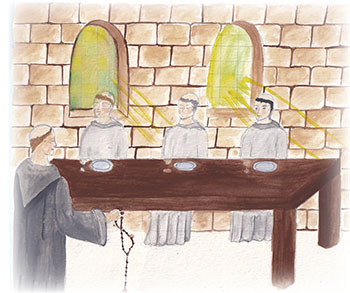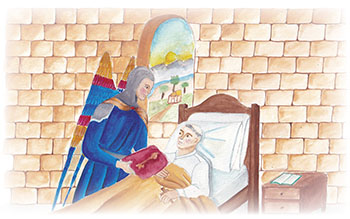While the first rays of the sun glimmered on the horizon, the bell of the Benedictine monastery sounded. A new day of praise to Jesus had begun! Gradually windows and doors began to open, and the sun could extend its light and warmth to the interior of that blessed abode.
The life of Saint Benedict’s disciples has always been regulated by the deep, resonant tolling of the bell. It marks the beginning and end of each activity of the day: the times for work and prayer, meals and rest.
Numerous monks lived in the monastery. Abbot Eustatius was their superior; Brother Norbert was bell-ringer; there were three cooks – Bothers Theodor, Sebastian, and Stephen; and the youngest monks were Brother Augustine and Brother Maurice. For the glory of God, by the intercession of the Blessed Virgin and the beloved founder, many others monks also dwelt under that same roof and grew in holiness day by day, following the Rule of their order. Not everyone, however, followed it down to the last detail…
One of the monks, Brother Cuthbert, was a case apart from the others. Baffled and blundering, he would arrive late at almost every community act, day in and day out. And when he did manage to arrive on time, he was unprepared for the activity at hand: he would show up with his prayer book to work in the fields, with a hoe to chant the Psalms, with his Rosary to sit down for a meal; he would stumble into the church when it was time for bed and head for his cell at recreation hour.
The kindly monks did their best to help him. It was no rarity to see one of the monks leading Brother Cuthbert to the right place, at the right time and with the right trappings. But cooperation and fraternal advice did not produce the expected result.

The poor befuddled fellow spent years in the same difficulty. Yet he managed to face his daily humiliations with acceptance, and continually manifest good cheer. He really did try to keep up with the community routine and, at times, he cried as he begged Heaven to grant him a change in behaviour. However, his failings continued to be the order of the day.
Despite the virtue of his religious brothers, impatience sometimes got the better of them. And there were moments when conversations like this could be heard:
“Brother Cuthbert is hopeless! After living the monastic life for all of these years, he has never learned, to this day, to follow the holy Rule.”
“Now don’t be so hard on him, Brother Sebastian!” put in Brother Norbert. “I always see him running to avoid being late. But it’s just that disaster strikes every time: he’s carrying what he shouldn’t be carrying, he mistakenly heads to the wrong place or trips over his own feet and tumbles to the ground… Poor man, it’s never intentional.”
Brother Julian, older than the others, also came to his defence:
“Yes, let’s look at his good points! He really is blundering, but, on the other hand, nothing ever puts a damper on his joy! Any one of us would have become discouraged long ago, but he always keeps up his spirits despite his hardships. This man is never shaken in his resolve. I give my testimony: Brother Cuthbert is a saint!”
“I am sorry, Brother Julian, but I cannot agree. I recognize that he always has an open and pleasant demeanour and a certain dogged persistence. However, it is common knowledge that the sanctification of a religious consists in following the holy Rule. If he breaks it so often with his shortcomings, he must not be as holy as you claim…”
These last words, proffered by Brother Stephen, sparked a full-fledged controversy! Abbot Eustatius caught wind of the “uproar”, and headed over to where the monks were gathered. His fatherly but serious presence produced an immediate hush. Then, breaking the silence, he asked:
“What were you talking about, my sons?”
Each of them presented his point of view. With exemplary balance, Abbot Eustatius listened and paid close attention to all. Finally, when the “hearing” was over, he said:
“We need to seek to understand what the Lord’s plan is for Brother Cuthbert. His tardiness and lapses are alarming indeed, and we no longer know what else can be done to help him improve. In all other respects, however, he is excellent: he displays filial submission to superiors, has sincere admiration for all of his brothers and an excellent spiritual life! Have you ever watched him while he’s at prayer? His devotion is outstanding! When I see him pray, I’m moved to tears. And it saddens me greatly that he is known as ‘the hopeless monk’.”
The years passed. A severe winter arrived and Brother Cuthbert fell seriously ill. He was now quite old and everything seemed to indicate that his days on this earth were drawing to a close.
One day, Brothers Augustine and Maurice – no longer the youngest in the monastery – were discussing the patient’s fate together.
“Brother Maurice, I am really concerned about Brother Cuthbert’s salvation. He never corrected his defect of lateness. How can he make it to Heaven without having succeeded in following the Rule?”
“I was wondering the same thing, Brother Augustine. I don’t think he would be condemned, but I imagine he would spend a considerable time in Purgatory. This matter keeps haunting me and I’ve been offering sacrifices and prayers for him.”
“I wonder what Abbot Eustatius think about all of this. Why don’t we go and ask him?” proposed Brother Augustine.
“Very well! Let’s ask him together.”
Each monk expressed his concern and then they asked the superior what he thought. He replied:
“I, too, have been pondering Brother Cuthbert’s case. He has many qualities, but he has not reached perfection. As a spiritual father, I must prepare him for his encounter with the Divine Judge. Go and gather the whole community together to pray for his passing.”
And he headed to where the “hopeless monk” lay ailing.
Tap-tap-tap! He knocked on the door. The monk who had been tending to Brother Cuthbert opened it and left the cell so that the two could speak alone.
“My father! I knew you would come soon!” exclaimed the dying man in a fading voice.
“What is that, my son?”

The abbot was astonished. Even sick, with depleted strength and nearing death, Brother Cuthbert glowed with more joy than ever before! What could have happened? The dying man himself explained:
“Just now, an Angel came to me. He was holding a magnificent key in his hands, like nothing I have ever seen on earth. I asked him what it all meant, and he replied: ‘As soon as you die, I will open the gates of Paradise to you. This key is not made of precious metal; it is made of love of humiliation, acceptance of God’s will, gladness amid fraternal correction and desire for perfection. These are the virtues that open Heaven’s doors to you.’ And He bade me reveal this great grace to you.”
And that is exactly what happened! In a few hours, the entire monastery encircled Brother Cuthbert’s bed to contemplate his serene and happy death. Having lived in holy abandonment to the will of God, without ever losing the desire for perfection despite his limitations, he ascended to a glorious eternity. ◊


